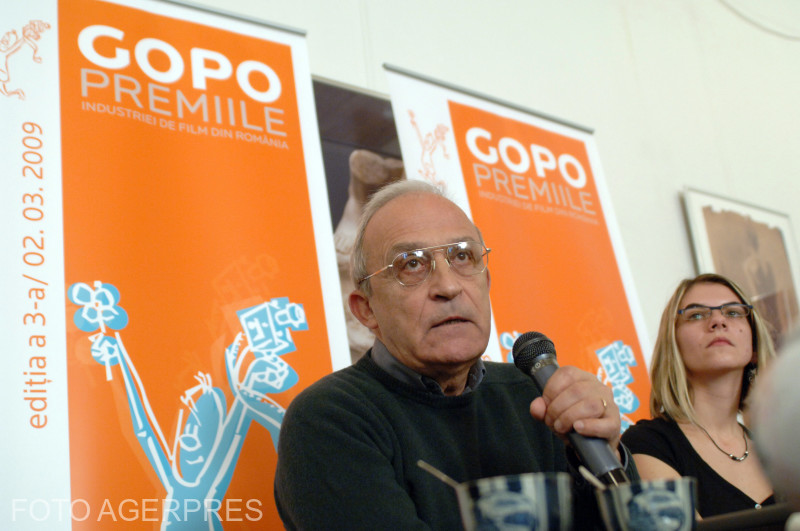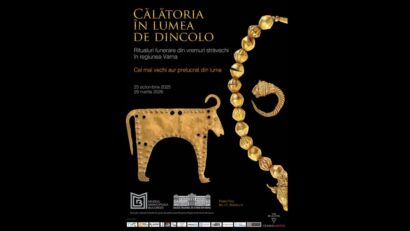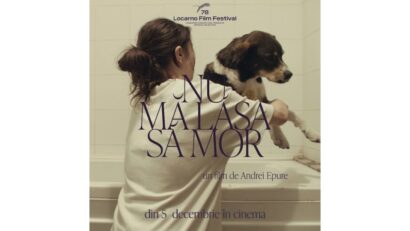Cinematographer Florin Mihăilescu wins Gopo lifetime achievement award
Florin Mihăilescu, one of the most talented and prolific cinematographers in Romania, won the lifetime achievement award at the Gopo Awards Gala.

Corina Sabău, 09.08.2025, 14:00
Florin Mihăilescu, one of the most talented and prolific cinematographers in Romania, won the lifetime achievement award at the Gopo Awards Gala for his essential contribution to the defining aesthetic of a number of emblematic films. With a career that goes back more than five decades, Florin Mihăilescu has worked with great Romanian film directors like Alexandru Tatos, Mircea Daneliuc, Dan Pița, Lucian Pintilie and Stere Gulea, while also writing and publishing academic essays. With Alexandru Tatos he worked on some of the director’s best-known films, including Gently Was Anastasia Passing, from 1980 and Sequences, from 1982, which particularly gave him a lot of freedom as a director of cinematography, a title he prefers to that of “image director”.
“I’ll start by saying that director of photography is the title that is used in most of Europe, that’s what the French and Italians say, but also the Americans, they all call the person who creates the image of a fiction film a director of photography. Image director rather makes me think of someone who evaluates someone’s image. This term, director of photography, has been accepted and has entered the language of film criticism for a long time, since the time when they shot on film and the film was a great mystery to everyone, except the director of photography. As for the quality of the image, I really like it when the film exists as an art object in itself, without singling out the different persons who contributed to its creation. If people watch a film and only note the image, I’m afraid that that is a bad film. I think it’s more important for a film to be an art object than for someone to stand out, regardless of whether they’re a set designer, cinematographer, editor, or make-up artist. Regarding the two films by Alexandru Tatos that are most dear to me, namely Gently Was Anastasia Passing and Sequences, I must say that they are two films that actually define Tatos very well, a director with a great potential for mixing theater and film. Sequences is, in fact, a film within a film about theater. It’s somewhat of a theatrical film, but because of that, it has a lot of charm, it gives the viewer a sense of contentment and satisfaction.”
Florin Mihăilescu also worked on Why Are the Bells Tolling, Mitică, Lucian Pintilie’s masterpiece from 1981, starring Victor Rebengiuc și Mariana Mihuț. The research for the film began in 1979, shortly after Pintilie came back to Romania, having initially left over disagreements with the censors and because of his refusal to agree to ideological interferences with his work. The film was inspired by a number of texts by I. L. Caragiale, including Carnival Night. Banned in 1981 on personal orders from Nicolae Ceaușescu, the film would only be aired in 1990, after the fall of the communist regime. Talking about his collaboration with Lucian Pintilie, Florin Mihăilescu noted the attention the former gave to the script and the special way he dealt with it cinematographically:
“Lucian Pintilie came from theatre, where he was already a household name. And yet he managed to bring all that with him to film. And it is true that we all tried to use as much as possible his concepts which he had borrowed from theater. The great challenge of the film was precisely this, the dismantling of theatrical instruments. Because otherwise the film risked becoming light entertainment. What we set out to achieve, and this was Lucian Pintile’s great goal, was for the film to become realistic, topical, of its day. I think that is also the reason why it is still very topical today, and those who watch it today recognise themselves in it, as it addresses all the attributes and sins of modern man. I admit that it would never have crossed my mind that I would start studying theater precisely to know how to dismantle it. Of course, I was very flattered when I received Lucian Pintile’s proposal to shoo t it, telling me that he had seen all the films I had worked on and that he chose me precisely for the realistic tone I had lent them.”
Florin Mihăilescu also worked closely with director Mircea Daneliuc, over the course of three decades. Together, they shot The Race and Special Edition, from 1975, Jacon, from 1988, The Eleventh Command, from 1991, The Toothless War, from 1992, and Fed Up, from 1994. He also worked on many films directed by Dan Pița, such as Lust for Gold, from 1974, co-directed by Mircea Veroiu, Filip the Kind, from 1975, This Above All, from 1978, co-directed by Nicolae Mărgineanu, and Poor Ioanide, from 1980. He collaborated with Stere Gulea for Bear’s Eye, from 1983, and Fox Hunter, from 1993, and with Sergiu Nicolaescu on Orient Express, from 2004. In parallel with his work as a cinematographer and as a teacher, Florin Mihăilescu also carried out a prolific journalistic activity, having his own column in Cinema magazine from 1985 until 1987. He also wrote three specialised books about cinematography.






























